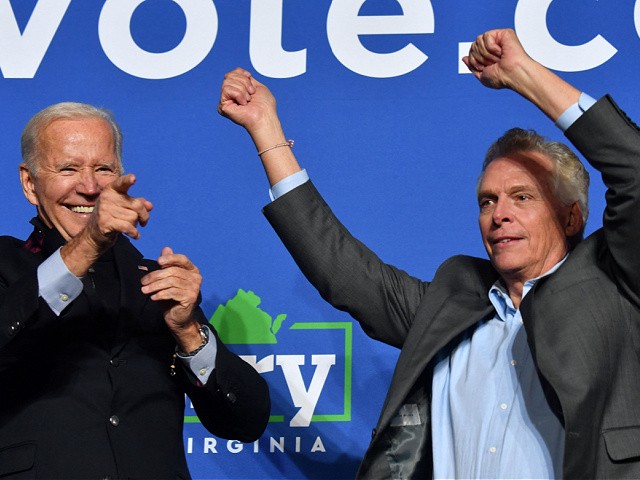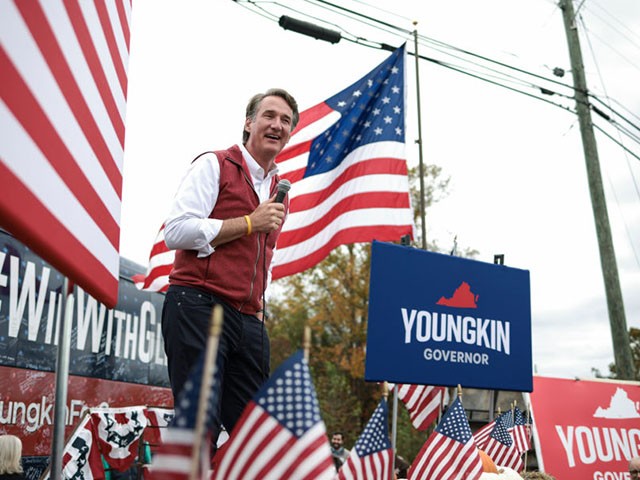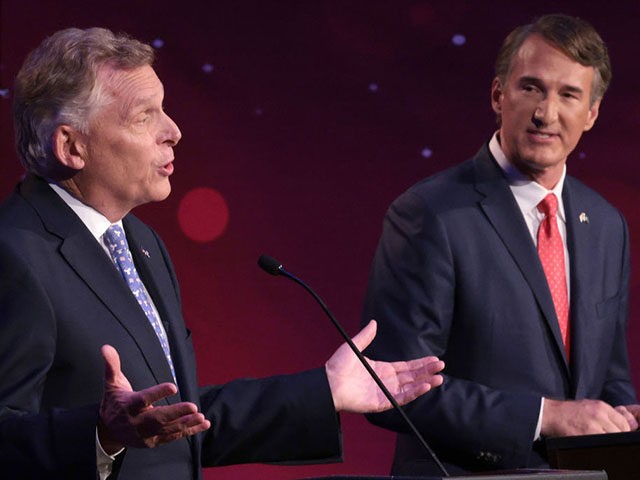Early voting numbers in Virginia’s governor’s election closed with record highs in the contested race between former Democrat Gov. Terry McAuliffe and Republican candidate Glenn Youngkin.
In the 2017 gubernatorial election, 189,891 voters cast early ballots. However, this year’s race saw nearly six times that number being turned in early, with 1,137,656 voters submitting early ballots. The data firm TargetSmart provides these numbers, which indicate that close to one-fifth of Virginia’s 5,975,696 electorate has already voted in this upcoming election.
Current Democrat Gov. Ralph Northam signed legislation into law in April 2020 amid the coronavirus pandemic that increased access to early voting. Before 2020, Virginians who sought to vote early were required to have a valid reason to request an absentee ballot. Now, there are no precursors for requesting an absentee ballot, and Virginians may vote 45 days before an election.

U.S. President Joe Biden and Virginia Democratic gubernatorial candidate Terry McAuliffe gesture during a campaign event at Virginia Highlands Park in Arlington, Virginia, on October 26, 2021. (Photo by NICHOLAS KAMM/AFP via Getty Images)
The first election with Virginia’s increased access to early voting was the 2020 presidential election. 2.8 million early ballots were cast in that election, with 1.3 million estimated Democrat ballots, 1.1 million estimated Republican, and close to 400,000 estimated independent ballots. In 2020, former President Donald Trump discouraged early voting. However, Youngkin is not making the same mistake in his election.
In the days leading up to the October 30 early voting deadline, Youngkin held multiple rallies close to early voting locations. Additionally, CNBC reported that Youngkin’s campaign “texted his partisan base to ask if they know their early voting site, and sent door knockers to ask if voters have requested their mail-in ballots.”
However, McAuliffe also pushed his voters to vote early. The data from the early voting numbers show a slight advantage for Democrats. According to TargetSmart statistics, 53 percent of the 1.1 million ballots cast were Democrat ballots, compared to 30.9 percent Republican ballots and 16.1 percent independent.
Early voting in this election began on September 17 when the governor’s race looked a lot different than it does now. At that time, McAuliffe led Youngkin by five points in the RealClearPolitics average. Since then, McAuliffe said during a debate, “I don’t think parents should be telling schools what they should teach,” which caused the election to shift its focus towards education issues. Furthermore, recent polls show the gap between Youngkin and McAuliffe is essentially nonexistent. Many polls have the race either tied or give either candidate a one-point advantage over the other. These polls are within the average margin of error. However, a recent Fox News poll showed Youngkin up by eight points over McAuliffe.

Virginia Republican gubernatorial candidate Glenn Youngkin delivers remarks at a campaign event in the parking lot of Vito’s Pizza Bar & Grill on October 28, 2021, in Amherst, Virginia. (Photo by Anna Moneymaker/Getty Images)
A recent poll also found that the second most important factor, after jobs and the economy, in Virginians’ vote for governor is education and schools. That poll also found that 79 percent of Republicans and 57 percent of independents want parents to have more influence on a school’s curriculum, compared to only 16 percent of Democrats.
Political analysts say that Democrats are more likely to cast early ballots, which could explain why the 2021 numbers favor Democrats. However, voter turnout is going to be the deciding factor in Tuesday’s election. As the Washington Post reports, “About a third of the early ballots cast have been in heavily Democratic and voter-rich Northern Virginia, which could benefit McAuliffe if that translates to a higher overall turnout in the region.”
If the turnout in 2021 is the same 47.6 percent as in 2017, a total of 2.8 million ballots will be cast in the state, just 1.7 million more than have been cast to date. However, with increased access to voting and national attention on this race, voter turnout levels could reach the 59.5 percent they did in the 2018 midterm elections. If that is the case, then 3.5 million ballots will be cast, which is 2.4 million more than early ballots cast.
With the increasing enthusiasm and an education-focused election, these numbers could foreshadow good news on election day in Virginia for Youngkin. If most Democrats vote early and Youngkin wins the Republican vote and keeps his lead among independent voters, he would be in good shape in the election. However, if Democrats can continue their early voting patterns into election day, McAuliffe will likely be successful on Tuesday.

COMMENTS
Please let us know if you're having issues with commenting.